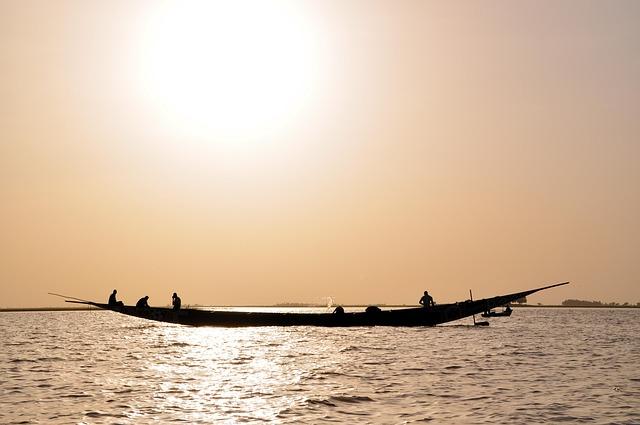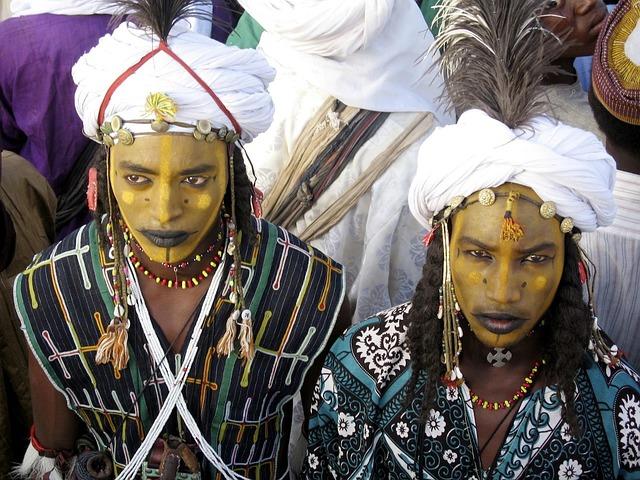In the wake of a military coup that has reshaped the political landscape of Niger,concerns over human rights violations have surged,drawing scrutiny from international watchdogs. Amnesty International has issued a stark assessment, arguing that the authorities have not only failed to uphold their commitment to protect essential human rights, but have also ushered in an era marked by increasing repression and violence. As the country grapples with the aftermath of the coup, reports of arbitrary detentions, suppression of dissent, and widespread abuses have alarmed both citizens and global observers. this article delves into the findings of Amnesty International, examining the disheartening trajectory of Niger’s human rights landscape and the urgent need for accountability and reform in the face of escalating abuses.
Niger’s Human Rights Crisis Deepens in the Wake of Military Takeover
the military takeover in Niger has led to a notable deterioration in human rights conditions across the nation. Reports indicate that the authorities are increasingly infringing upon fundamental freedoms, which where already fragile before the coup. Amnesty International highlights key areas of concern, including the rise in arbitrary detentions, suppression of free speech, and an alarming lack of accountability for abuses committed by security forces. Citizens who voice dissent or criticize the new regime face severe repercussions, creating an atmosphere of fear and repression that stifles any potential for peaceful dialogue or political resolution.
In response to these troubling developments, humanitarian organizations have called for urgent international intervention to protect the rights of Niger’s citizens.The following issues have emerged as critical focal points:
- Arbitrary Detentions: Individuals are being held without charge, often for expressing dissent.
- Media Suppression: Journalists face intimidation and censorship, limiting the flow of details.
- Violations of Rights: Reports of torture and ill-treatment in detention facilities have surged.
The lack of adherence to international human rights standards threatens to exacerbate the situation, leaving many vulnerable. The plight of those affected demands urgent attention and action from the global community to restore and protect basic human rights in Niger.
Amnesty International Reports Systematic Abuses Under New Regime
Amnesty International’s latest findings reveal a disturbing pattern of human rights violations in Niger since the military coup. The organization has documented a range of systematic abuses that undermine the fundamental rights of citizens. Notable instances include arbitrary arrests of political opponents, censorship of the media, and widespread retaliation against those exercising their right to free speech. The authorities have reportedly engaged in a crackdown on civil society, creating a climate of fear that stifles dissent and scrutiny.
Key concerns highlighted in the report include:
- detentions without trial: many activists and journalists remain imprisoned without formal charges.
- Suppression of protest: Peaceful demonstrations have met with excessive use of force by security personnel.
- Media censorship: Journalists face harassment and intimidation, leading to self-censorship in reporting.
This landscape of impunity raises critical questions about the commitment of the new regime to uphold internationally recognized human rights standards. As Niger finds itself at a crossroads, urgent action is needed to address these abuses and restore accountability within the government.
Voices silenced: The Increasing Crackdown on civil Liberties
As the military coup that seized power in Niger, there has been a disturbing trend towards the erosion of civil liberties. Authorities, who once pledged to protect human rights, are now increasingly suppressing dissent and stifling freedom of expression. Journalists, activists, and ordinary citizens who voice their opinions face intimidation, arrests, and even violence, creating an atmosphere of fear. Reports indicate that media outlets are under constant scrutiny, often leading to self-censorship among journalists wary of government repercussions.
The situation is further exacerbated by the government’s heavy-handed response to protests and public gatherings. Restrictions on assembly and vigorous crackdowns on dissenting voices have led to widespread alarm among human rights advocates. Some key issues highlighted by watchdog organizations include:
- Arbitrary detention of political opponents
- Closure of independent media outlets
- Restriction of internet access during periods of unrest
This climate of suppression not only undermines democratic principles but also poses a grave threat to the fundamental rights of individuals in Niger. Recent findings by Amnesty International underscore the urgent need for the international community to apply pressure on the authorities to honour their human rights commitments.
Urgent Call for Accountability: Recommendations for Niger’s Authorities
The situation in Niger following the military coup has raised serious concerns regarding the respect for human rights, prompting an urgent need for action from authorities. It is imperative that the government implements concrete measures to restore public trust and demonstrate its commitment to uphold fundamental freedoms. To achieve this, we recommend the following actions:
- Establish an Independent Oversight Body: Create a body tasked with monitoring human rights violations and ensuring accountability for those responsible.
- Conduct Prompt Investigations: Initiate immediate investigations into reported abuses, including arbitrary detentions and use of excessive force.
- Engage with Civil Society: foster dialogue with human rights organizations and community leaders to promote transparency and collaboration.
- Reinstate Rule of Law: Ensure that legal frameworks are upheld and that all citizens have access to effective legal representation.
Furthermore,it is crucial that niger’s authorities prioritize the protection of all citizens,regardless of their political stance. The establishment of a culture of accountability is essential not only for individual rights but also for the stability and security of the nation. The following measures should be prioritized:
| Measure | Expected Outcome |
|---|---|
| Training for Law Enforcement | Improved adherence to human rights standards in policing. |
| Public Awareness Campaigns | Increased awareness of citizens’ rights and avenues for reporting abuses. |
| Collaboration with International Bodies | Strengthened commitments to international human rights agreements. |
International Community’s Role in Addressing Human Rights Violations
The international community plays a crucial role in addressing human rights violations,especially in situations like Niger,where the military coup has led to widespread abuses.Organizations such as the United Nations,the African Union,and various NGOs are instrumental in mobilizing global attention and urging governments to take action against rights violations. Their efforts often include:
- Monitoring and Reporting: Agencies continuously gather and disseminate information on the human rights situation in Niger, shining a light on abuses that might otherwise go unnoticed.
- Diplomatic Pressure: By leveraging diplomatic channels, foreign governments can call for accountability and push the Nigerien authorities to adhere to their human rights commitments.
- Supporting Civil Society: Providing resources and training to local NGOs allows them to better advocate for human rights and support affected communities.
Furthermore, targeted sanctions against individuals or entities involved in human rights abuses can considerably impact the behavior of the authorities. The following table outlines potential sanctions the international community can utilize:
| Type of Sanction | Description |
|---|---|
| Asset Freezes | Preventing individuals from accessing their financial assets held abroad. |
| Travel Bans | Restricting entry into countries for those implicated in rights violations. |
| Arms Embargoes | Prohibiting the sale of weapons to the military regime. |
A Path Forward: Strategies for Promoting Human Rights in Niger
To enhance the protection of human rights in Niger,a multi-faceted approach is necessary. Civil society organizations should collaborate closely with international human rights bodies to amplify their voice and advocate for systemic reforms. Strengthening local governance structures and ensuring they are accountable to citizens can foster a culture that respects human rights. Moreover, educational initiatives aimed at raising awareness about human rights can empower citizens to claim their rights and highlight violations effectively.
In addition to grassroots efforts,international pressure on the Nigerien authorities is crucial. This can include targeted sanctions against individuals responsible for human rights abuses and a demand for transparent investigations into alleged violations. Engaging regional organizations, such as the Economic Community of west African states (ECOWAS), to mediate and facilitate dialogue between the military authorities and civil society can create pathways for reform. A collaborative platform for stakeholders to address human rights issues can be instrumental in building momentum for change. Below is a summary of potential strategies for promoting human rights:
| Strategy | Description |
|---|---|
| Advocacy Coalitions | Collaborate with NGOs and international bodies. |
| Public Awareness Campaigns | Educate citizens on their rights and available recourse. |
| International Engagement | Leverage diplomatic channels to apply pressure. |
| Monitoring mechanisms | Establish frameworks for tracking violations. |
Final Thoughts
As Niger grapples with the aftermath of the military coup, the findings from Amnesty International underscore a critical juncture for the country’s commitment to human rights.The report highlights a troubling pattern of abuses that have emerged in the absence of democratic accountability, drawing attention to the plight of civilians caught in the crossfire of political unrest. With authorities increasingly disregarding their obligation to protect the rights of their citizens, the international community faces a pressing challenge to ensure that Niger’s path forward does not further erode the foundational tenets of human dignity and justice.The time for accountability and respect for human rights is now; both Niger’s citizens and global stakeholders must advocate for a future where principles of liberty and justice are upheld, rather than undermined. As the situation develops,it is imperative to monitor the response from both local leaders and the international community to prioritize human rights and lay the groundwork for a lasting and democratic Niger.

